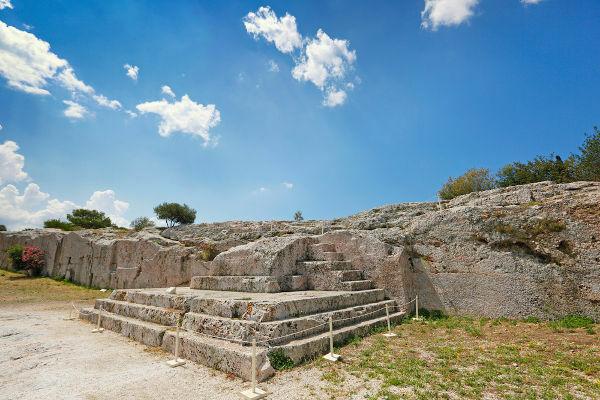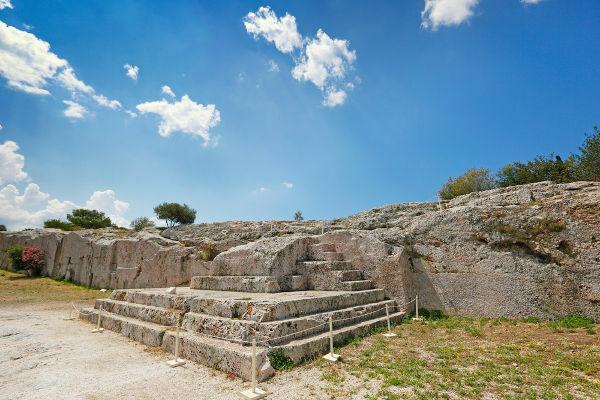THE democracyAthenian it is how we know the political system that existed in Athens, in Ancient Greece, from the end of the sixth century BC. Ç. This system arose from a political reform promoted by Cleisthenes, the city's legislator, and was the result of social tensions that existed due to the privileges of the aristocracy, the so-called eupatriates.
In the Athenian democracy, citizens were equal before the law, considering as a citizen a man over 18, born in Athens and the son of Athenian parents. The two main institutions of this democracy were the Bulé, the council that made the laws, and the Ecclesia, the assembly that made the decisions.
Accessalso: Pre-Homeric Greece - The Formation Period of the Greek People
Context of Athenian Democracy
Athens was one of the best known city-states(polis) of Ancient Greece. It is important to remember that Greece was organized in several polis, each one being autonomous in relation to the other. This form of organization meant that, over time, each Greek city developed its own form of government.
The case of Athens was no different, and the search for ways to manage society, as the city grew and its administration became more complex, led to the emergence of an innovative system in antiquity and served as an inspiration for the development of our political model current. We are talking about Athenian democracy.
The word democracy, then, is of Greek origin, but it is not known who coined it. She was the junction of demo, a word that can be generically translated as "people", and Kratos, which can be translated as “sovereign power”. So the meaning of democracy is the “sovereign power of the people”, although, in the context of Athens, the idea of the people or, as we shall see, of the citizen, was very limited.
Athenian Democracy
It was during the administration of Clístenes like legislator in Athens that a series of reforms was realized in 514 a. Ç. At Cleisthenes' reforms are considered as the responsible for the birth of democracy as a system that expands popular participation within politics. However, beware, the concept of citizenship in Athens is quite different from the current democratic model.
Among Cleisthenes' reforms is the recognition of the equality of all Athenian citizens under city law. The division of the city was reorganized and, instead of four tribes, there were now 10, organized by locality and not by income. The Bulé was maintained, but would be formed with 500 members, 50 from each tribe. It was Bulé's responsibility, for example, to formulate laws that would be voted on in Ecclesia.

THE ecclesia (people's assembly) was maintained in the political system of Athens, and in it all citizens had the right to participate in decision-making.. All decisions made in Athens were approved by those who participated in Ecclesia. The place where the members of the assembly met was the Pnyx Hill, capable of bringing together up to nine thousand people.
In Ecclesia, some people received the right to speak to those present, and everyone who spoke had the right to defend whatever they wanted (within the subject being debated). Once the speeches were made, those present would vote on whether or not they approved a certain measure. Voting was performed by raising the hand.
This system aimed, then, to guarantee an expansion of political participation and was in force in Athens and throughout Attica, the area in Greece that was within the Athenian influence radius. Athenian democracy was also concerned with creating ways to protect itself from people who tried to use it for their own benefit.
From this fear was born the ostracism, a mechanism that determined the expulsion of a person from Athens and Attica for a period of 10 years, if she take actions against Athenian democracy or accumulate great political power that would put its operation.
Athenian democracy, however, had its limitations. While it was unprecedented at the time—a system that guaranteed a voice for the most dispossessed people—this system still had considerable limitations, as the right to participate in politics was still restricted to men of legal age, born of father and mother Athenians.
The absolute majority of Athens thus remained outside the city's political process. However, as we have seen, Athenian democracy enabled a weakening of the local aristocracy, allowing rising groups to participate actively in politics. A significant example of this was given by the indication that any male offspring of an Athenian father and mother would have citizenship.
This harmed the Athenian aristocracy, which sought to strengthen its power through alliances with other cities, which generated heirs of parents born in different places. However, to be a citizen in Athens, it was necessary to have an Athenian father and mother, which therefore excluded children of parents from other cities, impeding the interests of the Eupatrids.
A person born in another city was perceived as a foreigner and had no political rights. With Cleisthenes' reforms, the social organization in Athens was as follows:
citizens: group of people born in Athens and of Athenian parents. They had political rights and the right to property.
Metecos: born in other cities and considered foreigners for that. They were well accepted in Athenian society, but had no right to citizenship. They were required to pay an annual tax to Athens for residing there.
Slaves: were usually prisoners of war. They had no possessions, no political rights.
Within Athenian democracy, the women born in the city were considered citizens, but had no right to participate in local politics and were, therefore, another excluded group.
Political reforms of Athenian democracy

These disputes within the political circles in Athens caused that, throughout the VII centuries a. Ç. and VI a. Ç., several reforms took place. Some of them brought quite rigid and harsh measures, but the whole process of political transformations in Athens resulted in the birth of democracy.
The first great reformer in Athens was dragon, that, in the VII century a. a., decreed a law on crimes committed in Athens. At the beginning of the VI century; Ç., solon he enacted laws that made great changes in the city. Through Solon's reforms, debt slavery was banned, for example.
Solon also created a city organization, placing Athenian citizens into four tribes based on income. The richer the group, the greater their political rights. After Solon, important institutions were also established for the discussion of political affairs in the city.
These institutions went to ecclesia, popular assembly, and the teapot, a council made up of 400 people (100 representatives from each of the city's tribes). This model broadened access to politics and somewhat weakened the power of the Athenian aristocracy. These measures, however, did not resolve class conflicts in Athens, and the remainder of the VI century BC. Ç. was marked by tension in the city.
Accessalso: Phoenicians - Semitic people who transmitted knowledge of the alphabet to the Greeks
Athens city
The city of Athens was an important polis of Greece, and we currently have considerable knowledge about it from the fact that it bequeathed us a great diversity of written documents. The Athens Region it was already inhabited by humans since the period of Neolithic, but the city only began to develop during the Homeric Period. Its growth made it dominate the entire region of Greece known as Attica.
The development of Athens took place in a scenario that the city's political power was concentrated in the hands of the elite (aristocracy), owner of land and wealth. This elite of rich people was known as eupatrids. As it was a growing city, new social groups emerged, each with their own demands.
Such groups were merchants, upstarts and a portion of the peasants. Conflicts between them became common and led some Athenian politicians to carry out reforms as a means of of putting an end to rivalries, resulting in political transformations in Athens that led to the birth of democracy.

